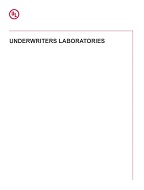Click here to purchase
Please note: All interim revisions for this edition available at time of your purchase will be included.
UL Standard for Safety for Mechanically and Electrically Operated Fuel Pumps for Marine Use,
UL 1130
Scope
The requirements in this standard apply to the construction and performance characteristics of fuel pumps intended for marine use that are:
Mechanically operated; or
Electrically operated and rated 50 volts dc or less,
and that are intended for use on recreational boats. The standard covers both independently mounted pumps and integrally mounted pumps used with engines or accessory devices. The standard also addresses pumps used to transfer fuel between tanks. Pumps covered by this Standard may be used with gasoline, diesel fuel, or both.
The requirements also cover accessories such as oil pressure switches, if provided, for use with the pump.
The pumps covered by these requirements are intended for installation and use in accordance with the applicable requirements of the U.S. Coast Guard (as specified in 33 CFR 183 Subpart J – Fuel Systems and 33 CFR 183 Subpart I – Electrical Systems), the standards of the American Boat and Yacht Council, Inc., and the Standard for Fire Protection of Pleasure and Commercial Motorcraft, NFPA 302.
These requirements do not cover mechanically or electrically operated marine fuel pumps intended for use in hazardous locations as defined in the United States Coast Guard Electrical Engineering Regulations. See 46 CFR Section 111.105-1.
These requirements cover ignition-protected pumps (for use with gasoline) that may be required on boats under 65 feet (19.8 m) in length. Pumps for use with diesel fuel are not required to be ignition protected.
A product that contains features, characteristics, components, materials, or systems new or different from those covered by the requirements in this standard, and that involves a risk of fire, electric shock, or injury to persons shall be evaluated using the appropriate additional component and end-product requirements as determined necessary to maintain the acceptable level of safety as originally anticipated by the intent of this standard. A product whose features, characteristics, components, materials, or systems conflict with specific requirements or provisions of this standard cannot be judged to comply with this standard. Where considered appropriate, revision of requirements shall be proposed and adopted in conformance with the methods employed for development, revision, and implementation of this standard.
Product Details
- Edition:
- 2nd
- Published:
- 03/01/1999
- Number of Pages:
- 24
